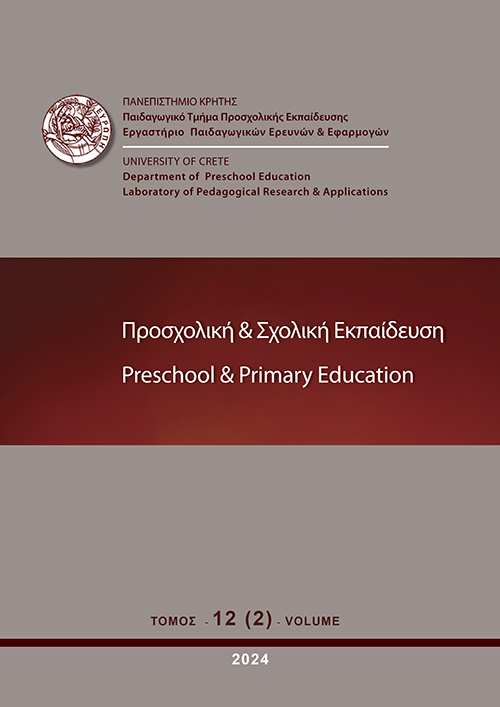Οι βραχυπρόθεσμες επιδράσεις της πρώιμης παρέμβασης στην ενίσχυση των δεξιοτήτων αναδυόμενου γραμματισμού σε παιδιά προσχολικής ηλικίας υψηλού κινδύνου για εμφάνιση δυσκολιών στην εκμάθηση του γραπτού λόγου

Περίληψη
Σκοπός της παρούσας διαχρονικής έρευνας ήταν να εξετάσει τoν ρόλο της διδακτικής παρέμβασης, που στηρίχτηκε στις αρχές της προσέγγισης «Ανταπόκριση στη Διδασκαλία – ΑσΔ», στην ενίσχυση των δεξιοτήτων αναδυόμενου γραμματισμού σε παιδιά προσχολικής ηλικίας υψηλού κινδύνου για εμφάνιση δυσκολιών στην εκμάθηση του γραπτού λόγου. Στην έρευνα συμμετείχαν πενήντα οκτώ παιδιά ηλικίας 5;1 έως 6;1 ετών. Στην πειραματική ομάδα εντάχθηκαν τριάντα τέσσερα παιδιά με χαμηλή επίδοση (κάτω από το 25ο εκατοστημόριο) τουλάχιστον σε τέσσερις από τις επτά σταθμισμένες δοκιμασίες αναδυόμενου γραμματισμού που τους χορηγήθηκαν. Στην ομάδα ελέγχου εντάχθηκαν είκοσι τέσσερα παιδιά, με τυπικές αλλά όχι υψηλές επιδόσεις στις αντίστοιχες δοκιμασίες. Αρχικά, υλοποιήθηκαν είκοσι δύο παρεμβάσεις: έντεκα για την ενίσχυση της φωνολογικής επίγνωσης και της γνώσης γραμμάτων και έντεκα για την ενίσχυση του λεξιλογίου και των εννοιών γραπτού λόγου. Στη δεύτερη φάση του πειραματικού σχεδιασμού πραγματοποιήθηκαν πέντε επιπλέον παρεμβάσεις εστιασμένες στις ελλείψεις των συμμετεχόντων όπως αυτές προέκυψαν από την αξιολόγηση της ανταπόκρισής τους στη διδακτική παρέμβαση. Η ομάδα ελέγχου παρακολούθησε το βασικό πρόγραμμα του νηπιαγωγείου, χωρίς καμία διαφοροποίηση. Τα αποτελέσματα έδειξαν ότι η παρέμβαση ΑσΔ συμβάλλει σημαντικά στην ενίσχυση των δεξιοτήτων αναδυόμενου γραμματισμού σε παιδιά προσχολικής ηλικίας υψηλού κινδύνου. Ειδικότερα, οι επιδόσεις της πειραματικής ομάδας στο τέλος του νηπιαγωγείου ξεπέρασαν τις επιδόσεις της ομάδας ελέγχου στο κριτήριο αναγνώριση κοινού αρχικού φωνήματος, στο δεκτικό λεξιλόγιο, στο εκφραστικό λεξιλόγιο και στην αντίληψη εννοιών γραπτού λόγου. Τα ευρήματα χρησιμεύουν στον έγκυρο εντοπισμό παιδιών υψηλού κινδύνου για εμφάνιση δυσκολιών στην εκμάθηση του γραπτού λόγου και συμβάλλουν στον σχεδιασμό προγραμμάτων πρώιμης διδακτικής παρέμβασης.
Λεπτομέρειες άρθρου
- Πώς να δημιουργήσετε Αναφορές
-
Κορακάκη Α., Μανωλίτσης Γ., & Τάφα Ε. (2024). Οι βραχυπρόθεσμες επιδράσεις της πρώιμης παρέμβασης στην ενίσχυση των δεξιοτήτων αναδυόμενου γραμματισμού σε παιδιά προσχολικής ηλικίας υψηλού κινδύνου για εμφάνιση δυσκολιών στην εκμάθηση του γραπτού λόγου . Preschool and Primary Education, 12(2), 179–199. https://doi.org/10.12681/ppej.37711
- Ενότητα
- Άρθρα

Αυτή η εργασία είναι αδειοδοτημένη υπό το CC Αναφορά Δημιουργού – Μη Εμπορική Χρήση – Παρόμοια Διανομή 4.0.
Οι συγγραφείς των άρθρων που δημοσιεύονται στο ΠΡΟΣΧΟΛΙΚΗ & ΣΧΟΛΙΚΗ ΕΚΠΑΙΔΕΥΣΗ διατηρούν τα δικαιώματα πνευματικής ιδιοκτησίας επί των άρθρων τους, δίνοντας στο περιοδικό το δικαίωμα της πρώτης δημοσίευσης. Άρθρα που δημοσιεύονται στο ΠΡΟΣΧΟΛΙΚΗ & ΣΧΟΛΙΚΗ ΕΚΠΑΙΔΕΥΣΗ διατίθενται με άδεια Creative Commons 3.0 και σύμφωνα με την άδεια μπορούν να χρησιμοποιούνται ελεύθερα, με αναφορά στο/στη συγγραφέα και στην πρώτη δημοσίευση για μη κερδοσκοπικούς σκοπούς και με δικαίωμα τροποποίησης μόνον με παρόμοια διανομή (αν αναμείξετε, τροποποιήσετε, ή δημιουργήσετε πάνω στο υλικό, πρέπει να διανείμετε τις δικές σας συνεισφορές υπό την ίδια άδεια όπως και το πρωτότυπο). To Εργαστήριο Παιδαγωγικών Ερευνών και Εφαρμογών του Παιδαγωγικού Τμήματος Προσχολικής Εκπαίδευσης του Πανεπιστημίου Κρήτης και το Εθνικό Κέντρο Τεκμηρίωσης διατηρούν το δικαίωμα να δημοσιεύουν, να αναπαραγάγουν, να παρουσιάζουν στο κοινό, να διανέμουν και χρησιμοποιούν άρθρα που δημοσιεύονται στο ΠΡΟΣΧΟΛΙΚΗ & ΣΧΟΛΙΚΗ ΕΚΠΑΙΔΕΥΣΗ σε οποιοδήποτε μέσο και μορφή είτε μεμονωμένα είτε ως μέρη συλλογικών έργων, για όλο το χρόνο διάρκειας προστασίας της πνευματικής ιδιοκτησίας και για όλες τις χώρες του κόσμου. Αυτό περιλαμβάνει ενδεικτικά και όχι αποκλειστικά, το δικαίωμα δημοσίευσης των άρθρων σε τεύχη του περιοδικού ΠΡΟΣΧΟΛΙΚΗ & ΣΧΟΛΙΚΗ ΕΚΠΑΙΔΕΥΣΗ, αναπαραγωγής και διανομής μεμονωμένων αντιγράφων των άρθρων, αναπαραγωγής ολόκληρων των άρθρων σε άλλη έκδοση του Εργαστηρίου Παιδαγωγικών Ερευνών και Εφαρμογών του Παιδαγωγικού Τμήματος Προσχολικής Εκπαίδευσης του Πανεπιστημίου Κρήτης και του Εθνικού Κέντρου Τεκμηρίωσης και αναπαραγωγής και διανομής των άρθρων ή περίληψης αυτών με χρήση πληροφορικού συστήματος αποθετηρίου.


